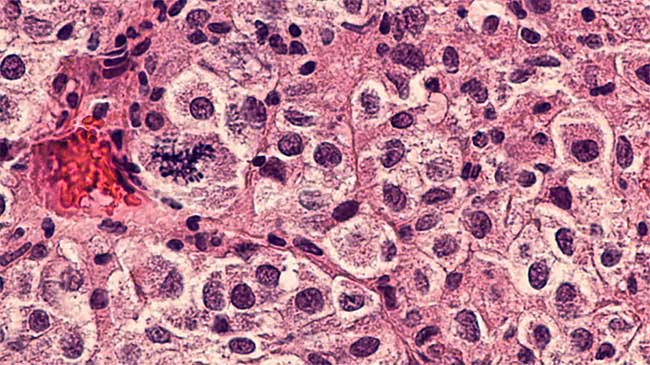Instead of preventing disease, mRNA vaccines will prompt the immune system to attack existing illnesses in the body, essentially treating cancer.
A Turning Point that Opens New Hope
In mid-April 2023, pharmaceutical companies Moderna and Merck announced additional data from trials of their mRNA vaccine, combined with immunotherapy for cancer treatment, showing promising results.
The experimental vaccine for skin cancer developed by Moderna is named mRNA-4157/V940, designed to prepare the immune system to respond to specific tumors. Meanwhile, Merck’s Keytruda immunotherapy is used to treat malignant tumors by stimulating the immune system to attack these tumors.
In trials involving 157 people who underwent surgery for malignant tumors, 78.6% of those receiving the vaccine in combination with Keytruda immunotherapy did not experience cancer recurrence after 18 months. Cancer recurrence or death occurred in 22.4% of those treated with the combination and 40% of those treated solely with immunotherapy. These encouraging figures highlight the effectiveness of the mRNA vaccine and Keytruda combination therapy.
The trial results indicate that the mRNA-4157/V940 vaccine, in conjunction with immunotherapy, effectively reduces the risk of malignant tumor recurrence in skin cancer patients. Dr. Kyle Holen, Senior Vice President and Head of Development, Therapy, and Oncology at Moderna, stated that these results demonstrate the potential of mRNA vaccines in treating patients with malignant tumors and open up possibilities for extending patient survival.
Previously, preliminary results from this trial were shared in December 2022, shocking the cancer research community. At that time, Moderna announced results showing that when the new combination vaccine therapy was used, the risk of death or disease recurrence was reduced by 44% compared to patients treated solely with Keytruda.
How Does the Cancer Treatment Vaccine Work?
Cancer mRNA vaccines differ from conventional vaccines. The focus of these vaccines is not on prevention but on acting as a personalized medicine aimed at training the immune system of the patient to combat cancer.
To create a vaccine dose, specialists will collect samples of the patient’s tumor and healthy tissue, sequence DNA and RNA, and compare the differences to identify mutations, which serve as antigens for the vaccine. After being injected into the body, the mRNA vaccine trains cells to produce a part of the cancer protein (antigen) similar to the previously tested antigen of the patient. The immune system then develops antibodies against these proteins.

Moderna expects cancer treatment vaccines to be applied from 2030 – (Photo: Getty Images).
Explaining further about the vaccine’s mechanism, the American Cancer Research Institute states that through the vaccine, researchers aim to create an immune response against the abnormal proteins of cancer cells.
However, these proteins do not appear on normal cells and vary among individuals, which is why the vaccine needs to be custom-made. This way, the immune system learns to recognize cancer cells as different from the rest of the body.
How is the Vaccine Production Process Carried Out?
Anna Osborne, a senior expert at Citeline Pharmaceuticals, stated: “Developing mRNA cancer vaccines is much more challenging than vaccines for infectious diseases. With the COVID-19 vaccine, everyone was administered the same type of vaccine, but with cancer, each vaccine is different and tailored to each individual.”
The production process begins with identifying genetic mutations in the patient’s tumor cells, examining which cells can produce new antigens. Then, they use computer algorithms to predict which antigens can bind to receptors on T cells, stimulating an immune response. Thus, the vaccine may include genetic sequences for 34 different antigens, activating T cells to specifically recognize each cancer cell based on abnormal molecular characteristics.
Dr. Julie Bauman, Deputy Director of the University of Arizona Cancer Center, who is involved in a clinical study testing cancer treatment with mRNA vaccines, added that Moderna produces the vaccine in about six weeks. Meanwhile, Paul Burton, Chief Medical Officer of Moderna, mentioned that the company could produce the vaccine in approximately eight weeks, hoping to reduce it to four weeks in the near future.
Dr. Eliav Barr, Global Clinical Development Head and Chief Medical Officer at Merck, stated that mRNA vaccine technology is ushering in significant advancements in immunotherapy for cancer treatment.
For over a decade, cancer researchers have been developing personalized cancer vaccines using mRNA technology to create new antigens. However, the specificity of the production process currently makes it extremely costly, estimated at up to $100,000 per patient, according to the National Cancer Institute and the CDC in the United States.
Dr. Barr also noted that advancements in mRNA technology, accelerated by the COVID-19 pandemic, have expedited the research of new vaccines. In the next 5 to 10 years, scientists aim to develop mRNA vaccines to treat various diseases, from common respiratory illnesses to cancer.
Which Types of Cancer Will the Vaccine Treat?
Moderna announced it will continue to advance research on vaccines for skin cancer and is targeting lung cancer. Another company, CureVac, is developing mRNA vaccines for ovarian, colorectal, and pancreatic cancer.
CureVac has a partnership with Tesla, a leading electric vehicle manufacturer in the U.S., to create mRNA bioprinters for printing patient-specific mRNA. Bioprinting is a technology that aims to recreate other body structures such as cartilage, blood vessels, or even vital organs in the future, using printing materials that contain live cells and other chemicals.
Meanwhile, Merck plans to study this method for other high-mutation cancers, such as lung cancer, bladder cancer, and some forms of breast cancer.

Cancer tumor developing in the body – (Photo: Guardian).
Another pharmaceutical company, Gritstone, is testing a self-amplifying mRNA vaccine, personalized in combination with immunotherapy for patients with progressing solid tumors.
Using the same technology, Moderna’s competitor BioNTech is collaborating with the Memorial Sloan Kettering Cancer Research Center to test a mRNA vaccine for pancreatic cancer.
Additionally, Moderna is also testing mRNA vaccines for influenza, respiratory syncytial virus (RSV) causing pneumonia, Zika virus, cytomegalovirus (which causes birth defects in children), and Nipah virus—a virus identified as a potential pandemic risk from fruit bats.
Various mRNA vaccines are being researched at different stages, from preclinical to early clinical trials, to evaluate the effects and efficacy of the vaccines in laboratory settings, on animals, or in small patient groups.
2030 is Not Far Off…
There are still many questions regarding mRNA cancer treatment vaccines that need answers. In the coming years, we will learn which cancers they will be most effective against. Experts believe this is a new, promising, and evidence-based hope for many cancer patients. This fall, Moderna and Merck will continue testing the vaccine.
Early-stage and late-stage cancer patients will receive the vaccine in combination with other immunotherapies to treat active cancer cells or prevent cancer recurrence. Moderna expects that cancer treatment vaccines will be widely available by 2030, potentially treating around 10,000 cancer patients.


















































